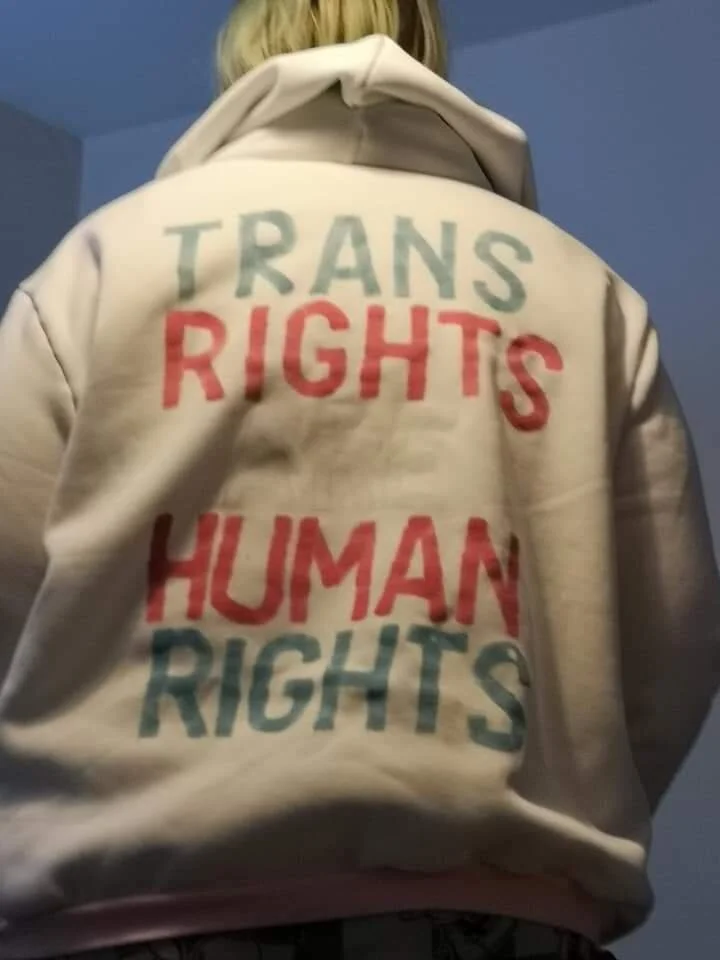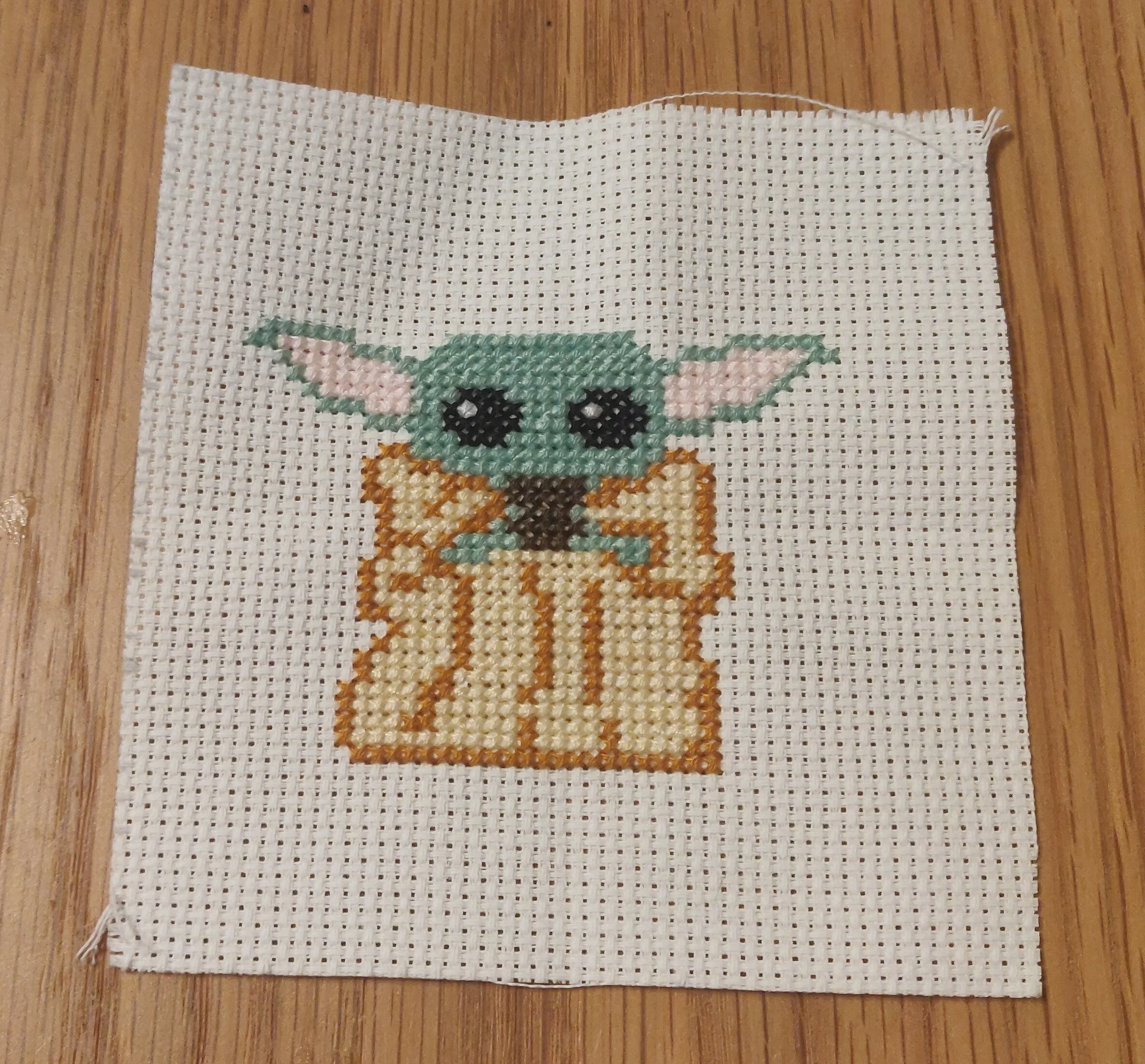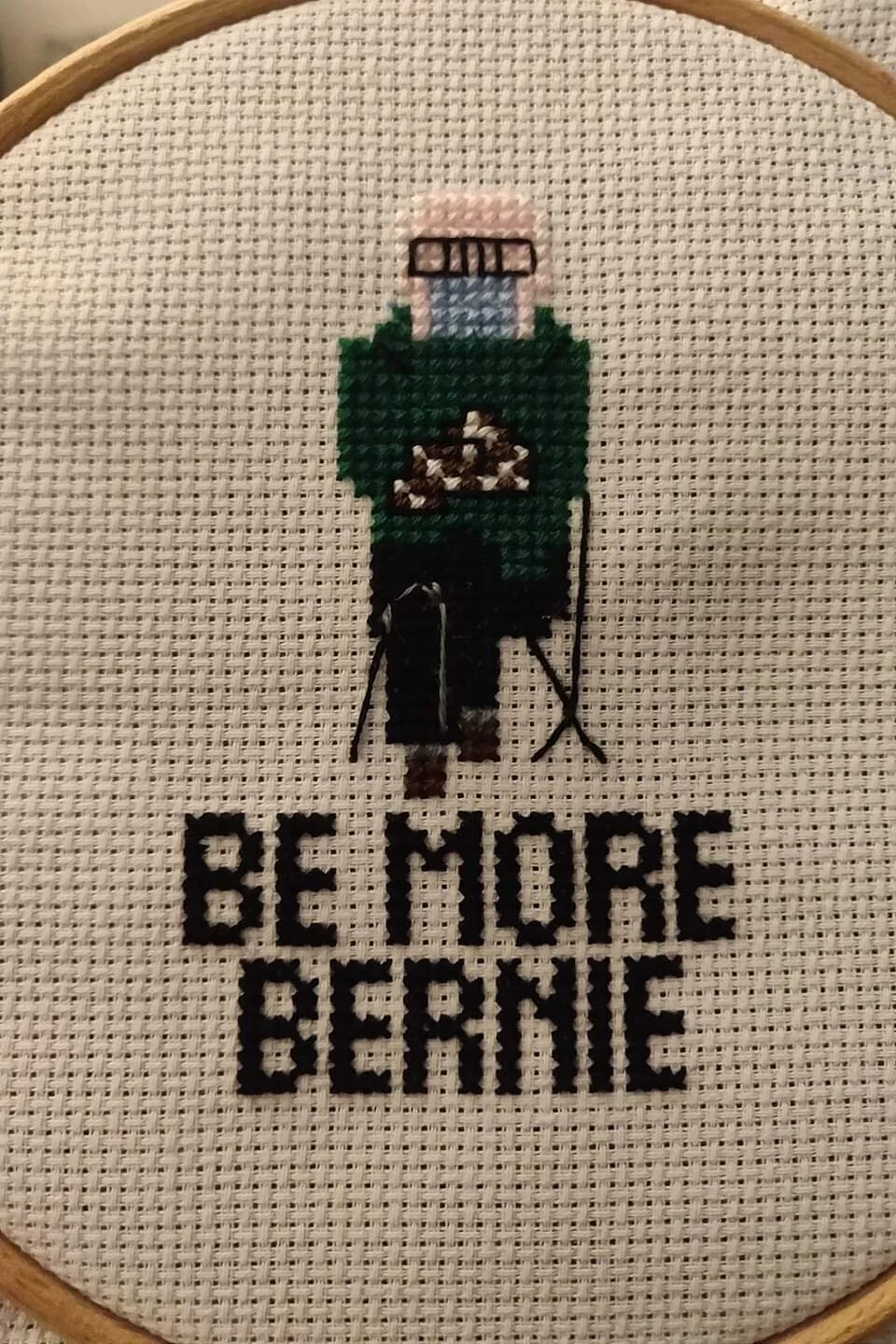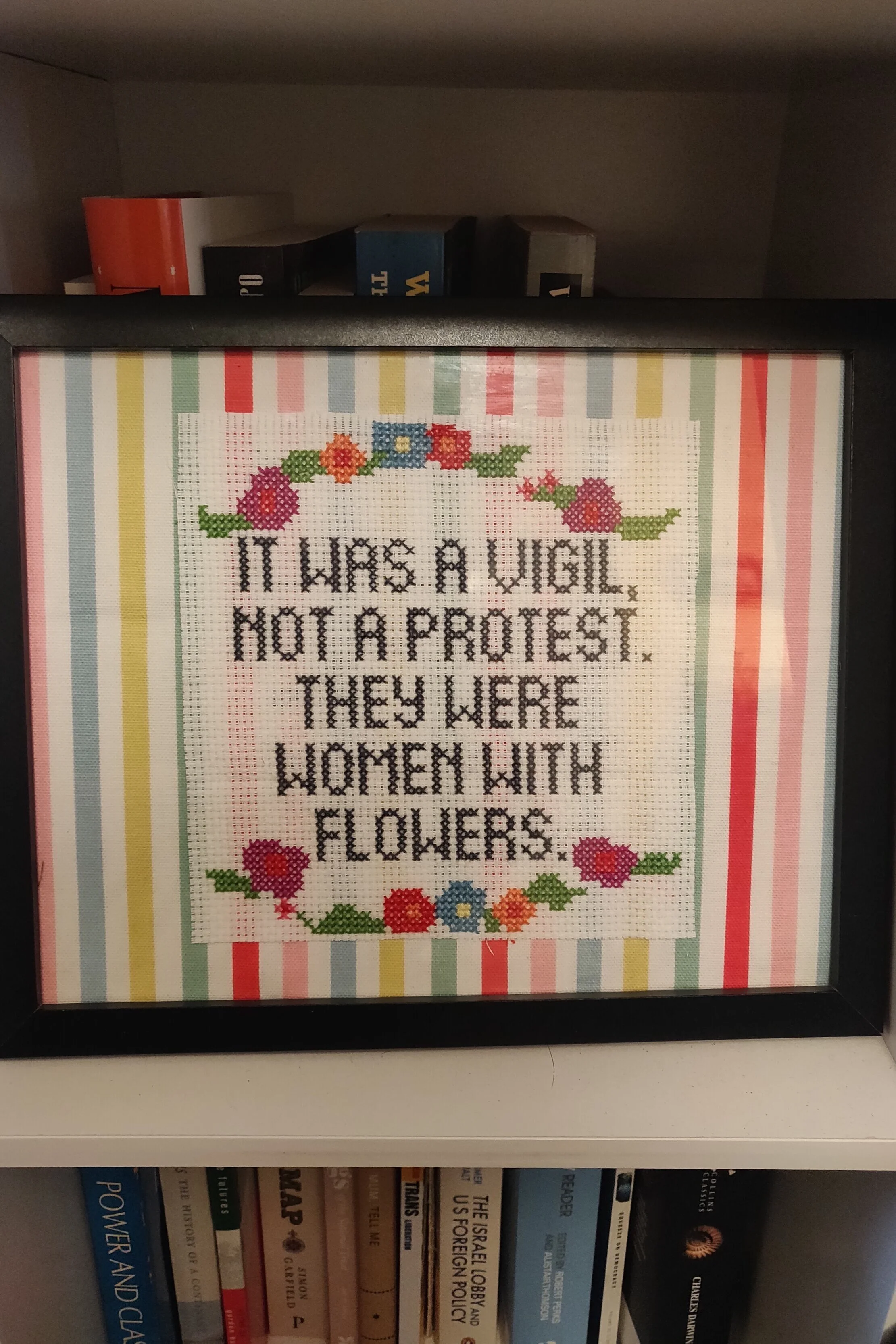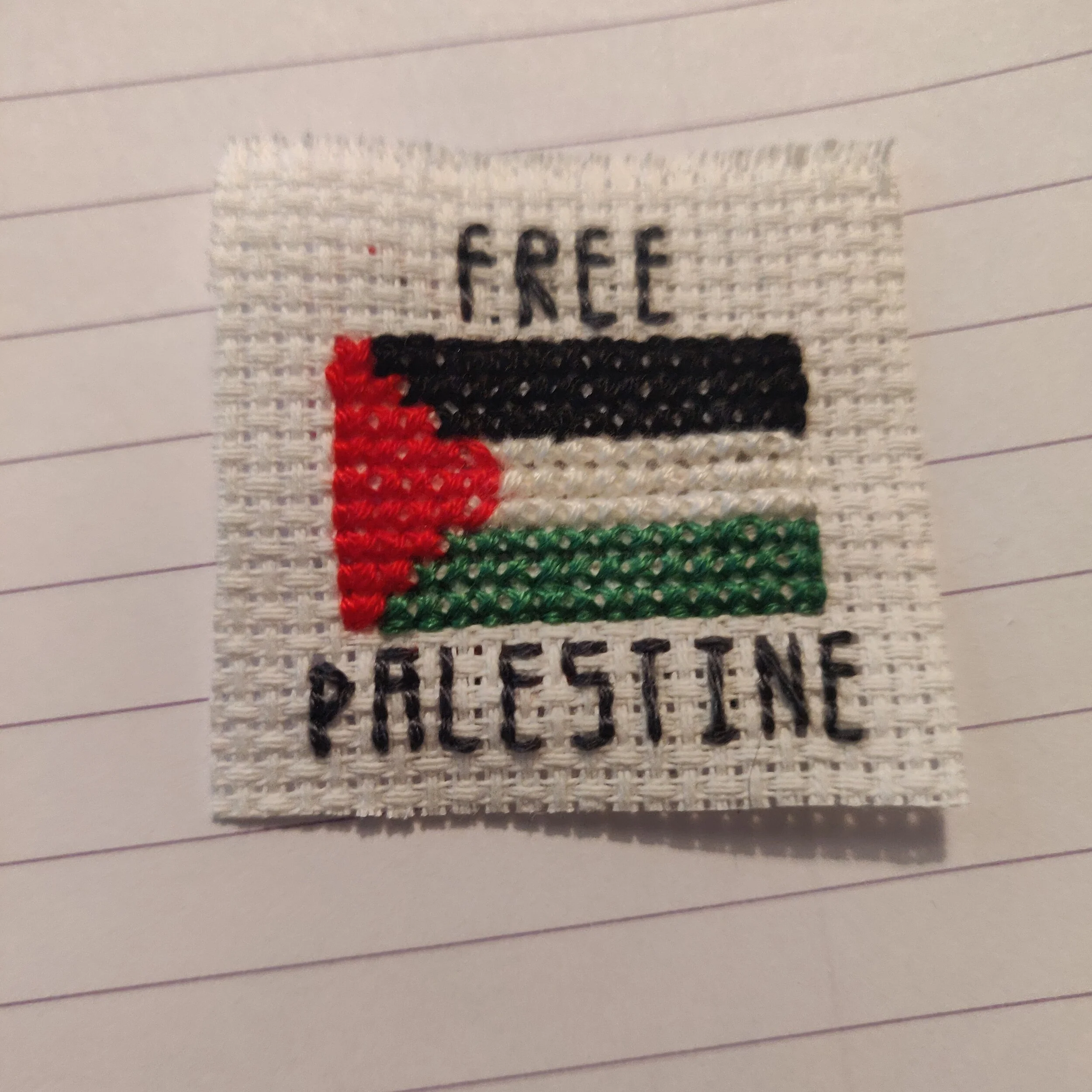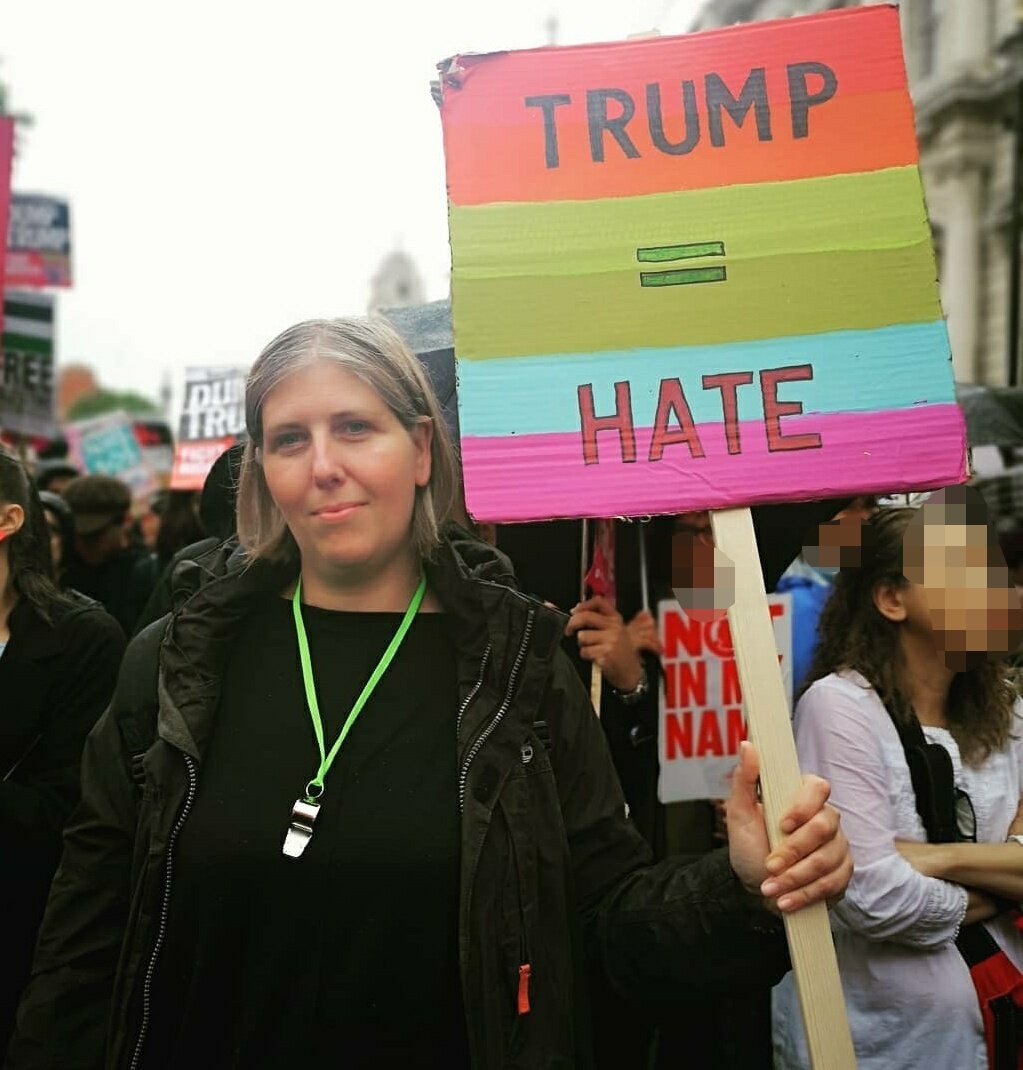Nell: Needlework as Activism
I have always been a crafty person, finding a hobby that interests me, buying all the things I need, and obsessing over it until Pinterest shows me something new and shiny. But fabric, needle, and thread have always called me back, anything from sewing forever friends cross stitch kits as a child to making my own clothes.
The back of white hooded sweatshirt worn by a blonde haired person. The words “Trans rights are human rights” have been painted on the back in pink, blue and white.
As everything began to close and we locked down, life started to become a little slower for me. Whilst for some this seemed to be a welcome relief, for me it brought anxiety. I needed to keep myself busy and I was missing being involved physically in activism. So after getting my diagnosis for ADHD last summer I started taking time to be kinder to myself and understand why my brain functions the way it does. Maybe I wasn't just rubbish at being an adult after all: the hyperfocus on ideas and projects, the procrastination around things that didn't spark joy, and my need to constantly be busy even when watching TV began to make sense. I have always been criticised for being glued to my phone – it was even listed by my ex in my divorce papers! Whether scrolling social media or playing merge games my phone gets in the way of my relationships as I zone out from real life in my pursuit of using 100% of my brain capacity. This is where needlework has come to the rescue, ticking several boxes for me: keeping my hands busy, and exploring ways to use it within activism.
My dad always said it was important to be involved in the world around us and challenge injustice. And although he gave lots of other sage pieces of advice this is one that has stuck with me and one that I have followed. I attended my first protest at the age of 19 in London against the Iraq war. A fire for change had been lit but unfortunately life got in the way and it turned into a smouldering ember for many years. Then, five years ago, life took a different path: I came out and started my university studies. By chance I heard that there would be a meeting to discuss how to challenge the corporatisation of Pride at the pub and I decided to pop along. That fire was lit once more. From being involved with protests against TERFs, the current government, and fascism to events educating around the issues of Pride, I soon realized that my mere existence as queer was political and in defience of society. I spoke at rallies and protests and attended my first Pride, not as a spectator or on a corporate float but with my queer siblings in rebellion against all that the pink washing of our resistance has done.
White Aida fabric with the Star Wars character Grogu cross-stitched, laid on a wood background.
I began to cross stitch with a purpose, no longer just sewing cute motifs like Grogu, but finding patterns that sent a message, from the inauguration of President Biden in the US to police behaviour at vigils in the UK.
Close-up of a cross-stitched version of the viral photo of Bernie Sanders sitting in a mask and mittens at the Biden inauguration, with the phrase “Be More Bernie” below.
A framed cross-stitch piece leaned on a bookcase, with the phrase “It was a vigil, not a protest. They were women with flowers” surrounded by blue, pink, and orange flowers.
I have even started dabbling in designing my own patterns like the one pictured below. This is my favourite so far, not only because I have a great feeling of pride from designing and stitching it but the message behind it. I started this project just as the #SaveSheikhJarrah hashtag was taking off and I was seeing yet more Palestinians losing their homes and facing violence from the Israeli state. I was also writing an essay for my degree about the history of Palestinian women refugees and how they have been forgotten and marginalised by mainstream historians and media. When I was stitching it I kept being reminded of something I read surrounding the struggles of the women’s movement in Palestine. “Only an end to the occupation will bring an end to these violations, and on the domestic front, meaningful progress will be an uphill struggle for the women’s movement without self determination and a viable Palestinian state.” (Hannah Rought-Brooks, Salwa Duaibis, and Soraida Hussein, “Palestinian Women: Caught in the Cross Fire Between Occupation and Patriarchy,” Feminist Formations, vol. 22, no. 3, 2010, pp. 124–45). It made me realise that I had separated the struggles of Palestinians in a different category to my feminism and queer liberation ideals. But in fact, unless queer liberation and feminism include the struggles of those in Palestine, it is not intersectional and is not complete.
White Aida fabric with Palestinian flag and the words “Free Palestine” stitched on it, laid on a lined white background.
Pieces like these can be shared either via social media, hung up around town, or turned into patches to draw attention to issues in a different way. All of these feel safe during a pandemic, but I am hoping that my passion for creating these pieces lasts beyond COVID. I'm excited to continue combining my fabric and real life activism together in ways that are satisfying and accessible for me.
Have you dabbled in the dark art of needlework? I would love to see your creations, political or not, using the hashtags #SewQueer and #SewQueerNeedlework.
Queer person with shoulder length hair, dressed in black, holding a protest sign with the words “Trump = hate” on a rainbow background.
Nell (she/they) is a queer sewist living in the south of England. They love sewing and use it to create clothing fitted to their body as well as to encourage change through craftivism. When they’re not sewing, they can be found at home with their partner, children, and dogs. They can be found on Instagram at @nellchipping.
To learn more about Nell, you can watch their IG Live conversation with SewQueer Founder, Shannon, on YouTube by clicking here.
Sew Queer is a community, and we welcome comments and discussion. In order to create a welcoming and multivocal space working towards a more just and equitable future, we review every comment before approval. Comments promoting racism, classism, fatphobia, ableism, or right wing political ideology are not allowed and will not be approved. For more details on commenting, visit our commenting guidelines.
